樊景立-组织公民行为量表、组织公平量表说课材料
- 格式:docx
- 大小:21.03 KB
- 文档页数:22
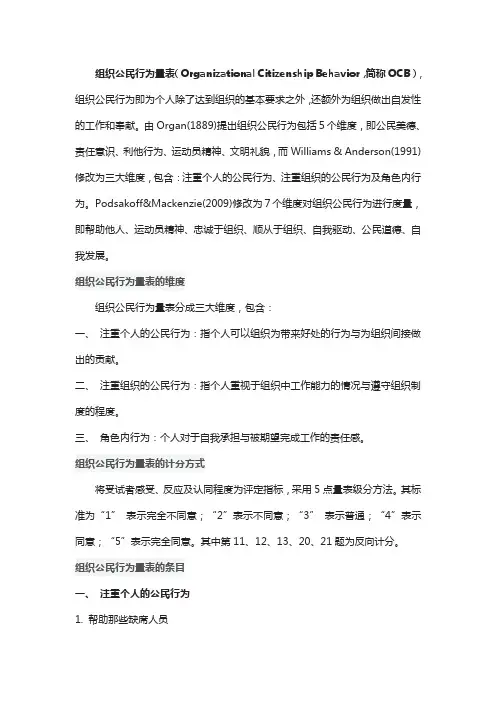
组织公民行为量表(Organizational Citizenship Behavior,简称OCB),组织公民行为即为个人除了达到组织的基本要求之外,还额外为组织做出自发性的工作和奉献。
由Organ(1889)提出组织公民行为包括5个维度,即公民美德、责任意识、利他行为、运动员精神、文明礼貌,而Williams & Anderson(1991) 修改为三大维度,包含:注重个人的公民行为、注重组织的公民行为及角色内行为。
Podsakoff&Mackenzie(2009)修改为7个维度对组织公民行为进行度量,即帮助他人、运动员精神、忠诚于组织、顺从于组织、自我驱动、公民道德、自我发展。
组织公民行为量表的维度组织公民行为量表分成三大维度,包含:一、注重个人的公民行为:指个人可以组织为带来好处的行为与为组织间接做出的贡献。
二、注重组织的公民行为:指个人重视于组织中工作能力的情况与遵守组织制度的程度。
三、角色内行为:个人对于自我承担与被期望完成工作的责任感。
组织公民行为量表的计分方式将受试者感受、反应及认同程度为评定指标,采用5点量表级分方法。
其标准为“1”表示完全不同意;“2”表示不同意;“3”表示普通;“4”表示同意;“5”表示完全同意。
其中第11、12、13、20、21题为反向计分。
组织公民行为量表的条目一、注重个人的公民行为1. 帮助那些缺席人员2. 帮助那些工作量繁重的人①完全不同意②不同意③普通④同意⑤完全同意3. 没有被要求时仍然协助上司完成他(她)的工作①完全不同意②不同意③普通④同意⑤完全同意4. 抽时间倾听同事遇到的问题和担忧①完全不同意②不同意③普通④同意⑤完全同意5. 主动自觉地帮助新员工①完全不同意②不同意③普通④同意⑤完全同意6. 对其他人员表达自我关注①完全不同意②不同意③普通④同意⑤完全同意7. 传递资讯给同事①完全不同意②不同意③普通④同意⑤完全同意二、注重组织的公民行为8. 对工作的参与度高于标准要求9. 提高对工作中能力欠缺的关注度①完全不同意②不同意③普通④同意⑤完全同意10. 本不该休息的时候停止工作①完全不同意②不同意③普通④同意⑤完全同意11. 花大量的时间打私人电话①完全不同意②不同意③普通④同意⑤完全同意12. 对工作中无关重要的事情经常抱怨①完全不同意②不同意③普通④同意⑤完全同意13. 节约和保护组织财产①完全不同意②不同意③普通④同意⑤完全同意14. 为维护秩序而遵守非正式的制度①完全不同意②不同意③普通④同意⑤完全同意三、角色内行为15. 恰当的完成布置的工作任务16. 能履行工作描述中明确指定的责任①完全不同意②不同意③普通④同意⑤完全同意17. 能完成被期望的任务①完全不同意②不同意③普通④同意⑤完全同意18. 满足工作要求的行为表现①完全不同意②不同意③普通④同意⑤完全同意19. 参与可直接对他(她)的绩效产生影响的活动①完全不同意②不同意③普通④同意⑤完全同意20. 忽视了他(她)本有义务去做的工作①完全不同意②不同意③普通④同意⑤完全同意21. 没有承担最基本的责任①完全不同意②不同意③普通④同意⑤完全同意。
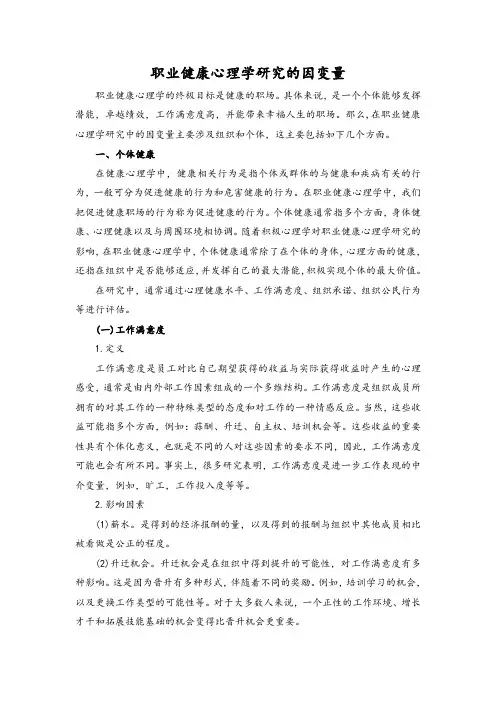
职业健康心理学研究的因变量职业健康心理学的终极目标是健康的职场。
具体来说,是一个个体能够发挥潜能,卓越绩效,工作满意度高,并能带来幸福人生的职场。
那么,在职业健康心理学研究中的因变量主要涉及组织和个体,这主要包括如下几个方面。
一、个体健康在健康心理学中,健康相关行为是指个体或群体的与健康和疾病有关的行为,一般可分为促进健康的行为和危害健康的行为。
在职业健康心理学中,我们把促进健康职场的行为称为促进健康的行为。
个体健康通常指多个方面,身体健康、心理健康以及与周围环境相协调。
随着积极心理学对职业健康心理学研究的影响,在职业健康心理学中,个体健康通常除了在个体的身体,心理方面的健康,还指在组织中是否能够适应,并发挥自己的最大潜能,积极实现个体的最大价值。
在研究中,通常通过心理健康水平、工作满意度、组织承诺、组织公民行为等进行评估。
(一)工作满意度1.定义工作满意度是员工对比自己期望获得的收益与实际获得收益时产生的心理感受,通常是由内外部工作因素组成的一个多维结构。
工作满意度是组织成员所拥有的对其工作的一种特殊类型的态度和对工作的一种情感反应。
当然,这些收益可能指多个方面,例如:蒜酬、升迁、自主权、培训机会等。
这些收益的重要性具有个体化意义,也就是不同的人对这些因素的要求不同,因此,工作满意度可能也会有所不同。
事实上,很多研究表明,工作满意度是进一步工作表现的中介变量,例如,旷工,工作投入度等等。
2.影响因素(1)薪水。
是得到的经济报酬的量,以及得到的报酬与组织中其他成员相比被看做是公正的程度。
(2)升迁机会。
升迁机会是在组织中得到提升的可能性,对工作满意度有多种影响。
这是因为晋升有多种形式,伴随着不同的奖励。
例如,培训学习的机会,以及更换工作类型的可能性等。
对于大多数人来说,一个正性的工作环境、增长才干和拓展技能基础的机会变得比晋升机会更重要。
(3)上级的支持。
就是上级提供技术帮助和行为支持的能力。
影响工作满意度的上级管理的风格有两个维度:一是员工中心性,可以通过上级对于员工的个人关注程度来测量。
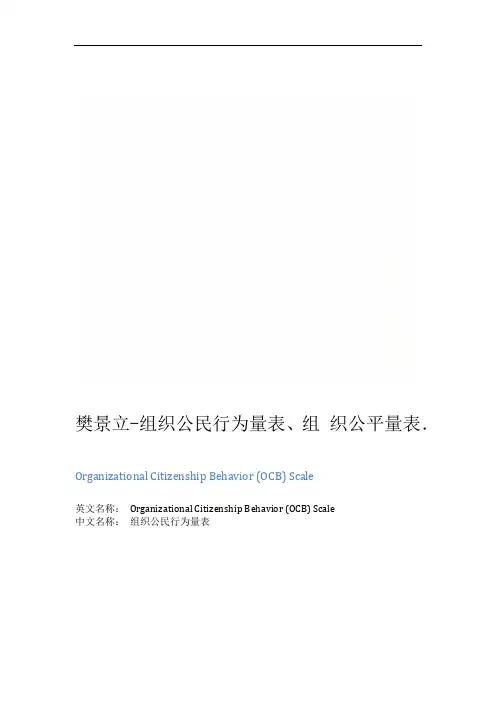
樊景立-组织公民行为量表、组织公平量表.Organizational Citizenship Behavior (OCB) Scale英文名称:Organizational Citizenship Behavior (OCB) Scale中文名称:组织公民行为量表作者:Farh, J. L., Earley, P. C., & Lin, S. C.出处:Farh, J. L., Earley, P. C., & Lin, S. C. “Impetus for action: A cultural analysis of justice and organizational citizenship behavior in Chinese society.”Administrative Science Quarterly, 1997, 42, 421-444.简介:条目:部属的工作行为:以下列叙述来描述他(她)的行为您是否同意?请逐项阅读后填答。
1-非常不同意5-有点同意2-相当不同意6-相当同意3-有点不同意7-非当同意4-不能确定Identification with the company认同组织Eager to tell outsiders good news about the company and clarify their misunderstandings主动对外介绍或宣传公司优点,或澄清他人对公司的误解。
Willing to stand up to protect the reputation of the company.努力维护公司形象,并积极参与有关活动。
Makes constructive suggestions that can improve the operation of the company. 主动提出建设性的改善方案,供公司有关单位参考。
.Actively attends company meetings.以积极的态度参与公司内相关会议。
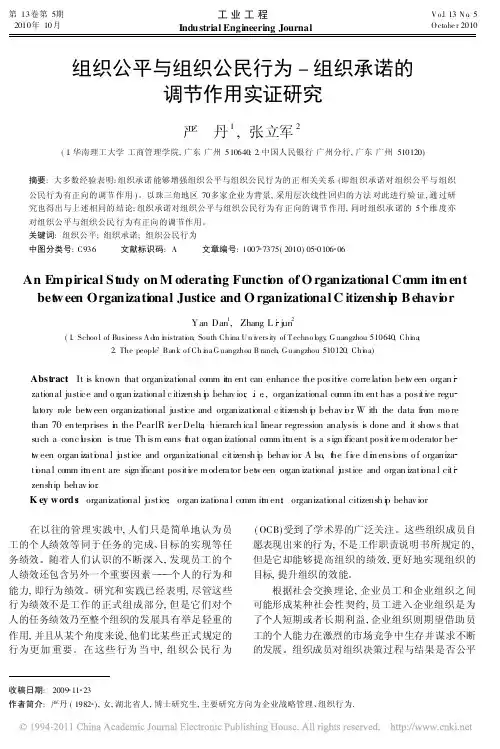
第13卷第5期2010年10月工业工程Industrial Engineering JournalV o.l 13N o .5O ctobe r 2010收稿日期:2009 11 23作者简介:严丹(1982 ),女,湖北省人,博士研究生,主要研究方向为企业战略管理、组织行为.组织公平与组织公民行为-组织承诺的调节作用实证研究严 丹1,张立军2(1.华南理工大学工商管理学院,广东广州510640;2.中国人民银行广州分行,广东广州510120)摘要:大多数经验表明:组织承诺能够增强组织公平与组织公民行为的正相关关系(即组织承诺对组织公平与组织公民行为有正向的调节作用)。
以珠三角地区70多家企业为背景,采用层次线性回归的方法对此进行验证,通过研究也得出与上述相同的结论:组织承诺对组织公平与组织公民行为有正向的调节作用,同时组织承诺的5个维度亦对组织公平与组织公民行为有正向的调节作用。
关键词:组织公平;组织承诺;组织公民行为中图分类号:C936 文献标识码:A 文章编号:1007 7375(2010)05 0106 06An Empirical Study on M oderati ng Functi on of O rganizational Co mm it m ent bet w een Organizati onal Justice and O rganizational C itizenshi p B ehavi orYan Dan 1,Zhang L i jun2(1.Schoo l of Business A d m i nistrati on ,South China U n i versity of T echno l ogy ,G uangzhou 510640,Chi na ;2.The people Bank o f Ch i na G uangzhou B ranch ,G uangzhou 510120,Chi na)Abst ract :It is kno wn that organizational co mm it m ent can enhance the positi v e corre lati o n bet w een organ i zational justice and o r gan izational c itizensh i p behav ior ,.i e .,organizational co mm it m ent has a positi v e regu latory role bet w een organizational justice and organizational c itizensh i p behav i o r .W ith the data fro m mo re than 70en ter prises i n the PearlR i v er Delta ,hierarch ica l linear regression analysis i s done and it sho w s thatsuch a conc l u sion is true .Th ism eans t h at or gan izational co mm it m ent is a sign ificant positi v e m oderator be t w een organ izati o na l j u stice and organizational citizensh i p behav ior .A lso ,t h e fi v e d i m ensi o ns o f organiza ti o na l co mm it m ent are sign ificant positi v e m odera tor bet w een or gan izational j u stice and organ izati o na l citi zenship behav ior .K ey w ords :organizational j u stice ;organ izati o na l co mm it m en;t organizational citizensh i p behav ior 在以往的管理实践中,人们只是简单地认为员工的个人绩效等同于任务的完成、目标的实现等任务绩效。
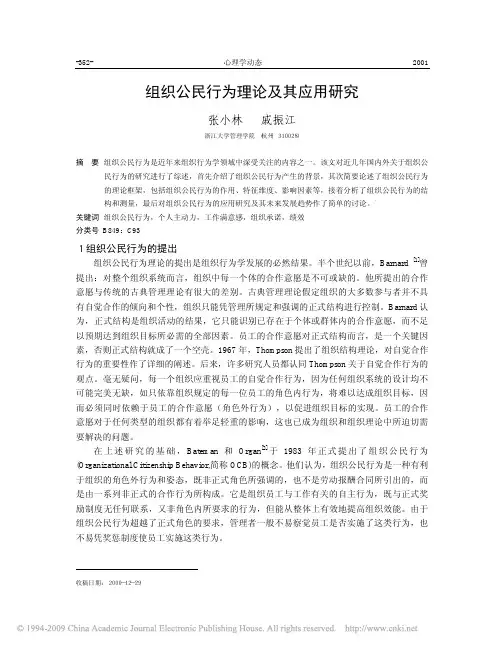
组织公民行为理论及其应用研究张小林戚振江浙江大学管理学院 (杭州 310028) 摘要组织公民行为是近年来组织行为学领域中深受关注的内容之一。
该文对近几年国内外关于组织公民行为的研究进行了综述,首先介绍了组织公民行为产生的背景,其次简要论述了组织公民行为的理论框架,包括组织公民行为的作用、特征维度、影响因素等,接着分析了组织公民行为的结构和测量,最后对组织公民行为的应用研究及其未来发展趋势作了简单的讨论。
⋅关键词组织公民行为,个人主动力,工作满意感,组织承诺,绩效分类号 B849:C931 组织公民行为的提出 组织公民行为理论的提出是组织行为学发展的必然结果。
半个世纪以前,Barnard [1]曾提出:对整个组织系统而言,组织中每一个体的合作意愿是不可或缺的。
他所提出的合作意愿与传统的古典管理理论有很大的差别。
古典管理理论假定组织的大多数参与者并不具有自觉合作的倾向和个性,组织只能凭管理所规定和强调的正式结构进行控制。
Barnard认为,正式结构是组织活动的结果,它只能识别已存在于个体或群体内的合作意愿,而不足以预期达到组织目标所必需的全部因素。
员工的合作意愿对正式结构而言,是一个关键因素,否则正式结构就成了一个空壳。
1967年,Thompson提出了组织结构理论,对自觉合作行为的重要性作了详细的阐述。
后来,许多研究人员都认同Thompson关于自觉合作行为的观点。
毫无疑问,每一个组织应重视员工的自觉合作行为,因为任何组织系统的设计均不可能完美无缺,如只依靠组织规定的每一位员工的角色内行为,将难以达成组织目标,因而必须同时依赖于员工的合作意愿(角色外行为),以促进组织目标的实现。
员工的合作意愿对于任何类型的组织都有着举足轻重的影响,这也已成为组织和组织理论中所迫切需要解决的问题。
在上述研究的基础,Bateman和Organ[2]于1983年正式提出了组织公民行为(Organizational Citizenship Behavior,简称OCB)的概念。

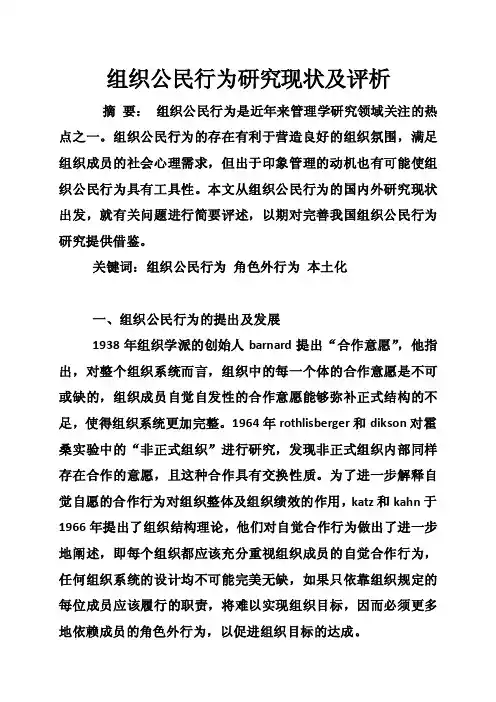
组织公民行为研究现状及评析摘要:组织公民行为是近年来管理学研究领域关注的热点之一。
组织公民行为的存在有利于营造良好的组织氛围,满足组织成员的社会心理需求,但出于印象管理的动机也有可能使组织公民行为具有工具性。
本文从组织公民行为的国内外研究现状出发,就有关问题进行简要评述,以期对完善我国组织公民行为研究提供借鉴。
关键词:组织公民行为角色外行为本土化一、组织公民行为的提出及发展1938年组织学派的创始人barnard提出“合作意愿”,他指出,对整个组织系统而言,组织中的每一个体的合作意愿是不可或缺的,组织成员自觉自发性的合作意愿能够弥补正式结构的不足,使得组织系统更加完整。
1964年rothlisberger和dikson对霍桑实验中的“非正式组织”进行研究,发现非正式组织内部同样存在合作的意愿,且这种合作具有交换性质。
为了进一步解释自觉自愿的合作行为对组织整体及组织绩效的作用,katz和kahn于1966年提出了组织结构理论,他们对自觉合作行为做出了进一步地阐述,即每个组织都应该充分重视组织成员的自觉合作行为,任何组织系统的设计均不可能完美无缺,如果只依靠组织规定的每位成员应该履行的职责,将难以实现组织目标,因而必须更多地依赖成员的角色外行为,以促进组织目标的达成。
在上述研究的基础上,bateman和organ于1983年首次提出了组织公民行为的概念。
而后,organ于1988年在《组织公民行为:好战士现象》一书中正式提出了“组织公民行为”的概念,他将组织公民行为定义为:组织成员自觉自愿表现出来的,并没有被组织正式报酬体系直接或明显认可的,但在总体上有利于组织有效运转的个体行为。
locALhosT1997年organ又基于“关系绩效”的概念对组织公民行为的涵义进行了修正。
organ将组织公民行为重新定义为:“有助于维持和增强任务绩效的社会和心理环境行为。
”这一概念被多数学者接受。
组织公民行为作为组织成员角色外的且有利于组织生存和发展的行为,可以表现在组织与他人、群体,组织和领导等多方面关系中,其主要表现有7个维度,即利他主义、运动员精神、组织遵从、公民美德、个人主动性、组织忠诚和自我发展7个方面。
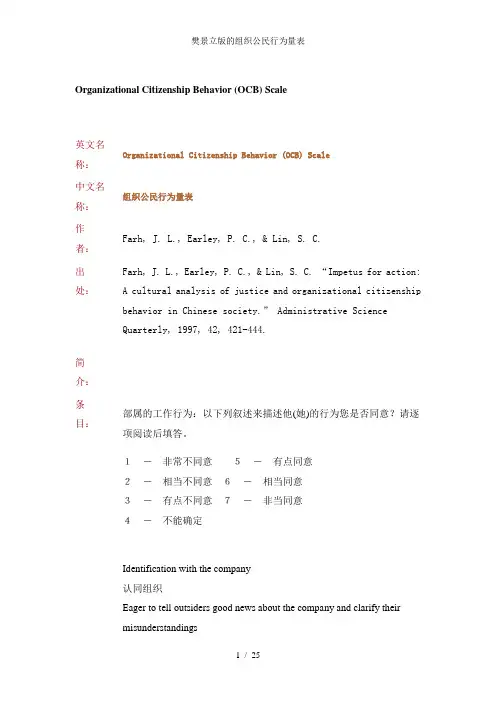
Organizational Citizenship Behavior (OCB) Scale英文名称:Organizational Citizenship Behavior (OCB) Scale 中文名称:组织公民行为量表作者:Farh, J. L., Earley, P. C., & Lin, S. C.出处:Farh, J. L., Earley, P. C., & Lin, S. C. “Impetus for action: A cultural analysis of justice and organizational citizenship behavior in Chinese society.” Administrative Science Quarterly, 1997, 42, 421-444.简介:条目:部属的工作行为:以下列叙述来描述他(她)的行为您是否同意?请逐项阅读后填答。
1-非常不同意5-有点同意2-相当不同意6-相当同意3-有点不同意7-非当同意4-不能确定Identification with the company认同组织Eager to tell outsiders good news about the company and clarify their misunderstandings主动对外介绍或宣传公司优点,或澄清他人对公司的误解。
Willing to stand up to protect the reputation of the company.努力维护公司形象,并积极参与有关活动。
Makes constructive suggestions that can improve the operation of the company.主动提出建设性的改善方案,供公司有关单位参考。
Actively attends company meetings.以积极的态度参与公司内相关会议。

樊景立-组织公民行为量表、组织公平量表Orga ni zati onal Citize nship Behavior (OCB) Scale英文名称:Orga ni zatio nal Citize nship Behavior (OCB) Scale中文名称:组织公民行为量表 作 者:Farh, J. L., Earley, P C., & Lin, S. C.出处:Farh, J. L., Earley, P C., & Lin, S. C. “ Impetusfor action: A cultural analysis of j ustice and orga ni zati onal citize nship behavior in Chin ese rative ScienceQuarterly, 1997, 42, 421-444.简介:条目:以下列叙述来描述他(她)的行为您是否同意?请逐项阅读后填答。
4 —不能确定Identification with the company认同组织Eager to tell outsiders good n ews about the compa ny and clarify their mis un dersta ndings 主动对外介绍或宣传公司优点,或澄清他人对公司的误解。
Willi ng to sta nd up to protect the reputati on of the compa ny.努力维护公司形象,并积极参与有关活动。
Makes con structive suggesti ons that can improve the operati on of the comp any.主动提出建设性的改善方案,供公司有关单位参考Actively atte nds compa ny meet in gs.以积极的态度参与公司内相关会议。
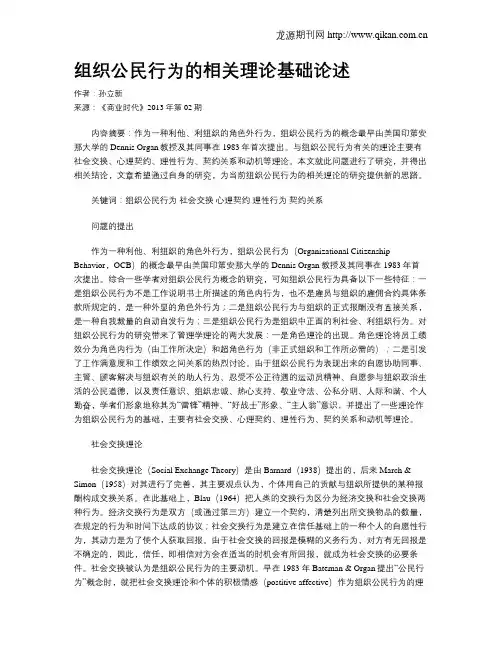
组织公民行为的相关理论基础论述作者:孙立新来源:《商业时代》2013年第02期内容摘要:作为一种利他、利组织的角色外行为,组织公民行为的概念最早由美国印第安那大学的Dennis Organ教授及其同事在1983年首次提出。
与组织公民行为有关的理论主要有社会交换、心理契约、理性行为、契约关系和动机等理论。
本文就此问题进行了研究,并得出相关结论,文章希望通过自身的研究,为当前组织公民行为的相关理论的研究提供新的思路。
关键词:组织公民行为社会交换心理契约理性行为契约关系问题的提出作为一种利他、利组织的角色外行为,组织公民行为(Organizational Citizenship Behavior,OCB)的概念最早由美国印第安那大学的Dennis Organ教授及其同事在1983年首次提出。
综合一些学者对组织公民行为概念的研究,可知组织公民行为具备以下一些特征:一是组织公民行为不是工作说明书上所描述的角色内行为,也不是雇员与组织的雇佣合约具体条款所规定的,是一种外显的角色外行为;二是组织公民行为与组织的正式报酬没有直接关系,是一种自我裁量的自动自发行为;三是组织公民行为是组织中正面的利社会、利组织行为。
对组织公民行为的研究带来了管理学理论的两大发展:一是角色理论的出现。
角色理论将员工绩效分为角色内行为(由工作所决定)和超角色行为(非正式组织和工作所必需的);二是引发了工作满意度和工作绩效之间关系的热烈讨论。
由于组织公民行为表现出来的自愿协助同事、主管、顾客解决与组织有关的助人行为、忍受不公正待遇的运动员精神、自愿参与组织政治生活的公民道德,以及责任意识、组织忠诚、热心支持、敬业守法、公私分明、人际和谐、个人勤奋,学者们形象地称其为“雷锋”精神、“好战士”形象、“主人翁”意识,并提出了一些理论作为组织公民行为的基础,主要有社会交换、心理契约、理性行为、契约关系和动机等理论。
社会交换理论社会交换理论(Social Exchange Theory)是由 Barnard(1938)提出的,后来March & Simon(1958)对其进行了完善,其主要观点认为,个体用自己的贡献与组织所提供的某种报酬构成交换关系。

组织公民行为公民行为是指公民在社会生活中所表现出的行为方式和行为态度。
作为一个有责任感和意识的公民,我们应该积极参与社会事务,主动承担公民义务,促进社会的发展与进步。
组织公民行为正是为了引导和规范公民的行为,使其更加有序、有效地参与社会建设和治理。
一、理解组织公民行为的意义组织公民行为是社会公民所具备的道德、政治和法律义务的具体体现。
它旨在引导公民以法律为准绳,以道德为指导,发挥自身作用,参与社会事务,共建和谐社会。
通过组织公民行为,我们能够更好地激发公民责任感和社会意识,增强社会凝聚力和民主共识,构建社会和谐与稳定。
二、学习形成良好的公民行为习惯1. 尊重他人在社会交往中,我们应该尊重他人的个人尊严和人权。
无论是在家庭、学校还是工作场所,我们都应该以友好、礼貌和包容的态度面对他人,平等对待每一个人,避免歧视和偏见的言行。
2. 社会公德作为公民,我们应该时刻把社会公德放在心中。
维护社会的公共秩序,遵守交通规则,不乱扔垃圾,不随地吐痰,不在公共场所大声喧哗等,是我们应该具备的良好行为习惯。
3. 参与公共事务公共事务决策的结果往往会影响到公民的切身利益。
因此,我们应该积极参与公共事务的讨论和决策过程。
去了解政府的政策,通过合法途径表达自己的声音,参与志愿者活动和社区建设等,都是组织公民行为的具体方式。
4. 维护法律尊严法律是社会的红线,是我们公民行为的底线。
我们应该遵守法律,不违法乱纪,同时也要积极宣传法律意识,增强法治观念,引导他人理性遵法。
当我们发现违法行为时,可以通过向有关部门举报等方式,为维护法律尊严出一份力。
三、善用组织公民行为的途径1. 利用互联网互联网是信息传播的重要渠道,我们可以通过社交媒体、博客等途径将我们的意见和建议反馈给相关政府部门,借助网络平台发起一些公益活动,让更多的人参与其中。
2. 参与社会组织社会组织是公民参与社会事务的重要途径之一。
我们可以加入一些志愿者组织、公益机构或者职业协会,通过这些组织参与一些社会公益活动,展现我们的责任感与担当。
大学生组织公平感测量量表的编制——研究设计报告作者:学号:摘要组织公平感是研究组织行为的一项重要指标,它反映了企业内员工对组织“公平”的感受。
组织公平对工作满意度、组织承诺、组织公民行为等的影响,发现组织公平感与这些变量之间均有显著的关系。
组织公平感及其相关变量的研究给组织内部的人力资源管理提供了很多参考意见。
高效是较特殊的组织,而大学生作为组织内部成员,与学校并没有直接的利益关系,也没有线性的“晋升”渠道,但与企业运营还是有很多相似之处的人。
、本研究目的在于设计适合大学生使用的组织公平感量表,进而对大学生组织公平感进行测量与研究,以对大学的管理工作提供参考,提高学生的学习“绩效”。
关键词:组织公平感大学生量表编制目录摘要 (1)1理论综述 (3)1.1组织公平感的含义 (3)1.2国外组织公平感的研究 (3)1.3国内组织公平感的研究 (5)1.4组织公平感的测量 (6)2研究设计 (6)3假设 (7)4预期结果 (7)5管理意义 (7)参考文献 (9)1理论综述1.1组织公平感的含义1965年组织科学开始研究公平感。
在汉语中,“公平”与公正、正义和平等意思相近,但它们的含义和用法却有一些差别。
如平等含有平均的意思,公『F 和正义除了有平等的意思,还有伦理道德。
英语中,表示公平的词有justice,fairness,equity等。
如equity指多劳多得就是公平,justice与fairness最常见。
本研究采用常见的用法“公平”(英文中常用iustice或fairness)。
“公平是指处事不偏袒,合理”。
人们对“不偏袒,合理”的看法各不相同,因此事实上怎样才算公平没有统一的标准,现实中也没有绝对的公平,只有相对的公平。
公平是人们的一种主观感受,很多时候也称为“公平感”。
组织行为学中将公平看作一种社会心理,只要一般人认为一种行为是公平的,这种行为就是公平的。
组织公平感是指在组织中人们所感受到的公平。
中国文化下的组织公民行为分析作者:陈虹来源:《商情》2012年第08期[摘要]激发员工的组织公民行为对员工个人和组织来说,是一种双赢的管理活动。
本文将员工作为组织的内部顾客,在基础理论支持方面提出应将理论起点深化到需求分析,并结合中国传统文化,寻找改进之道,目的是帮助中国企业更好地对组织公民行为进行内部营销。
[关键词]组织公民行为;中国文化;需求分析;传导机制;内部营销现代组织的发展面临着复杂多变的环境,这使传统的管理面临着严重挑战。
人们越来越多地注意到,具有弹性的组织结构和管理模式才能适应这种变化。
但是与此也带来了组织结构设计和任务划分中的诸多问题。
很多工作岗位的任务不能清晰地划分,出现了重叠或空缺的现象。
为使组织更好的运行,并达到相应的绩效水平,这些方面的任务必须有人负责完成。
顺应时代发展趋势,“组织公民行为”逐渐进入人们的视野,在一定程度上帮助组织衔接任务,提高绩效。
本文对国内外有关OCB的研究进行了梳理,在中国特有的社会文化中进行分析,并结合需求理论提出了一些符合中国国情,提升组织公民行为的思考和建议。
一、组织公民行为定义的演进OCB的研究起源于Bamard(1938)年提出的“想要合作的意愿”(willingness t0 cooperate)。
随后Organ于1988年出版的《组织公民行为:好战士现象》中首次明确提出“组织公民行为”(OrganizationalCitizenship Behaviour,OCB)概念。
其定义为,组织公民行为是一种员工随意的个体行为,与正式的奖励制度没有直接或外显的联系,但能从整体上有效提高组织效能。
同时他将OCB分为利他、谦恭有礼、尽职行为、运动家精神、公民道德五个维度。
从Organ提出OCB至今仍没有明确且公认的定义,比如在已有文献中出现了“公民行为”(Civic Behaviour)、“自发行为”(Organizational Spontane,ity)等称谓。
企业边缘化界定及影响企业边缘化界定及影响近年来,员工边缘化问题得到了学界和实务界的共同关注。
边缘化难免会对员工的心理状态造成一定的影响,但是否就必然导致其工作绩效的降低值得探讨,此外员工的哪些个体特征可能导致其被边缘化也需要明晰。
为提升内部凝聚力和整体竞争力,企业有必要透过人力资源管理工作,对员工边缘化问题进行预防和干预。
一、相关理论与研究假设20世纪20年代,美国社会学家帕克(R.E.Park)首先从通婚和移民的角度提出了基于种族或文化的社会成员“边缘化”现象。
随后,美籍德国心理学家勒温进一步提出了“边缘人”的概念,是指生活在两个截然不同社会文化之间的人对参加哪个团体,接受哪种文化价值和标准难以做出抉择。
我国著名社会学家费孝通先生曾指出,中国社会具有“差序格局”的特征。
台湾学者郑伯埙也认为,组织系统中存在关系、忠诚和才能等三类“格局”,而处于边缘地带的员工往往晋升机会较少,发展空间有限。
西方学者Graen等提出的领导者一成员交换理论将下属区分成圈内人与圈外人,而后者就可能是被“边缘化”的。
企业边缘人是在企业中可能对组织文化特别是核心价值观不太认同,而长期处于企业系统的边缘,或者未能通过个体与企业的共同努力而顺利完成内化,从而导致工作满意度、归属感、组织认同感和忠诚度不高的员工。
基于模仿生物种群中为争夺稀有资源和生存条件的相互打压、排挤现象,Williams(1997,2001)曾提出了“职场排斥”(work place ostracism)的概念,它反映了组织中边缘人与周围群体的关系。
我国学者刘军等(2009)从关系和组织政治的角度,也探讨过工作绩效、公民行为、与上司关系等与员工边缘化的关系。
在前人研究的基础上,本文希望进一步考察边缘化对员工行为和业绩的影响等问题。
为此,建立以下三个基本假设:H1:边缘化程度与工作绩效显著负相关,边缘化程度能够预测工作绩效水平。
H2:边缘化程度与离职意向显著正相关,边缘化程度能够预测离职意向程度。
组织公平量表(Organizational Justice Scale,简称OJS),概念源自Homans(1961)提出的社会交换理论中,提及个体于社会交换过程之中,期望付出与获得之间能够公平分配。
Niehoff 与Moorman(1993)将组织公平量表,分为三个维度,包含:(1)分配公平(Distributional justice):意指员工知觉其工作任务及薪酬分配的方式是否公平的程度;(2)程序公平(Procedural justice):意指员工知觉组织制定决策的程序与过程是否公平的程度;(3)互动公平(Interactional justice),意指员工知觉组织领导于决策的过程互动沟通是否公平的程度,量表总共为20个条目。
计分方式将受试者感受、反应及认同程度为评定指标,采用五点量表级分方法。
其标准为“1”表示非常不同意;“2”表示不同意;“3”表示普通;“4”表示同意;“5”表示非常同意。
量表的条目一、分配公平1. 我的工作排班是公平的。
①非常不同意②不同意③普通④同意⑤非常同意2. 我认为我的薪酬水平是合理的。
①非常不同意②不同意③普通④同意⑤非常同意3. 我认为我的工作负荷量相当公平。
①非常不同意②不同意③普通④同意⑤非常同意4. 我觉得我的工作职责是公平的。
①非常不同意②不同意③普通④同意⑤非常同意5. 总体而言,我在公司获得的报酬相当公平。
①非常不同意②不同意③普通④同意⑤非常同意二、程序公平6. 领导会以公正的态度做出工作决定。
①非常不同意②不同意③普通④同意⑤非常同意7. 领导会在工作决定前听取所有员工的意见。
①非常不同意②不同意③普通④同意⑤非常同意8. 领导会在工作决定前收集准确完整的信息。
①非常不同意②不同意③普通④同意⑤非常同意9. 领导会应员工的要求说明决定原因并提供额外信息。
①非常不同意②不同意③普通④同意⑤非常同意10. 所有的工作决定无论对谁都前后一致。
Organizational Citizenship Behavior(OCB)Scale英文名称:Organizational Citizenship Behavior(OCB)Scale中文名称:组织公民行为量表作者:Farh,J.L.,Earley,P.C.,&Lin,S.C.出处:Farh,J.L.,Earley,P.C.,&Lin,S.C.“Impetus for action:A cultural analysis of justice and organizational citizenship behavior in Chinese society.”Administrative Scien ce Quarterly,1997,42,421-444.简介:条目:部属的工作行为:以下列叙述来描述他(她)的行为您是否同意?请逐项阅读后填答。
1-非常不同意5-有点同意2-相当不同意6-相当同意3-有点不同意7-非当同意4-不能确定Identification with the company认同组织Eager to tell outsiders good news about the company and clarify their misunders tandings主动对外介绍或宣传公司优点,或澄清他人对公司的误解。
Willing to stand up to protect the reputation of the company.努力维护公司形象,并积极参与有关活动。
Makes constructive suggestions that can improve the operation of the company.主动提出建设性的改善方案,供公司有关单位参考。
Actively attends company meetings.以积极的态度参与公司内相关会议。
Altruism toward colleagues协助同事Willing to assist new colleagues to adjust to the work environment.主动帮助新进同仁适应工作环境。
Willing to help colleague solve work-related problems.乐意协助同仁解决工作上的困难。
Willing to cover work assignments for colleague when needed.主动分担或代理同事之工作。
Willing to coordinate and communicate with colleagues.主动与同事协调沟通。
Impersonal harmony不生事争利(人际和睦)Often speaks ill of the supervisor or colleagues behind their backs.(R)经常在背后批评主管或谈论同事之隐私。
(R)Uses illicit tactics to seek personal influence and gain with harmful effect on inter personal harmony in the organization.(R)在公司内争权夺利,勾心斗角,破坏组织和谐。
(R)Uses position power to pursue selfish personal gain.(R)假公济私,利用职权谋取个人利益。
(R)Takes credits,avoids blames,and fights fiercely for personal gain.(R)斤斤计较,争功诿过,不惜抗争以获得个人利益。
(R)Protecting company resources公私分明Conducts personal business on company time(e.g.,trading stocks,shopping,goin g to barber shops).(R)利用上班时间处理私人事务,如买股票,跑银行,逛街,购物,上理容院...等。
(R)Uses company resources to do personal business(e.g.,company phones,copy ma chines,computers,and cars).(R)利用公司资源处理私人事务,如:私自利用公电话,复印机,计算机,公务车...等。
(R)Views sick leave as benefit and makes excuse for taking sick leave.(R)经常借口请假,视为福利。
(R)Conscientiousness敬业守法Often arrives early and starts to work immediately.上班时经常提早到达,并着手处理公务。
Takes one’s job seriously and rarely makes mistakes.工作认真,并且很少出差错。
Complies with company rules and procedures even when nobody watches and no evidence can be traced.即使无人注意或无据可查时,亦随时遵守公司规定。
Does not mind taking new or challenging assignments.从不挑选工作,尽可能接受新的或困难的任务。
Tries hard to self-study to increase the quality of work outputs.为提升工作品质,而努力自我充实。
信度:效度:备注:Organizational Justice Scale英文名称:Organizational Justice Scale中文名称:组织公平量表作者:Jason A.Colquitt出处:Colquitt,J.A.(2001)."On the Dimensionality of Organizational Justice:A Construct Validation of a Measure."Journal of Applied Psychology86(3):386-400条目:Procedural justiceThe following items refers to the procedures used to arrive at your (outcome). To what extent:1.Have you been able to express your views and feelings during these procedures?2.Have you had influences over the (outcome) arrived at by those procedures?3.Have those procedures been applied consistently?4.Have those procedures been free of bias?5.Have those procedures been based on accurate information?6.Have you been able to appeal the (outcome) arrived at by those procedures?7.Have those procedures upheld ethical and moral standards?Distributive justiceThe following items refer to your (outcome). To what extent:1.Dos your (outcome) reflect the effort you have put into your work?2.Is your (outcome) appropriate for the work you have completed?3.Does your (outcome) reflect what you have contributed to the organization?4.Is your (outcome) justified, given your performance?Interpersonal justiceThe following items refer to (the authority figure who enacted the procedure). Towhat extent:1.Has(he/she)treated you in a polite manner?.2.Has(he/she)treated you with dignity?3.Has(he/she)treated you with respect?4.Has(he/she)refrained from improper remarks or comments?Informational justiceThe following items refer to (the authority figure who enacted the procedure). To what extent:1.Has (he/she) been candid in (his/her) communication with you?2.Has (he/she) explained the procedures thoroughly?3.Were (his/her) explanations regarding the procedures reasonable?4.Has (he/she) communicated details in a timely manner?5.Has (he/she) seemed to tailor (his/her) communications to individuals’ specific needs?信度:效度:备注:Procedural Justice英文名称:Procedural Justice中文名称:程序公平作者:Farh,J.-L.,P.C.Earley,et al.出处:Farh,J.-L.,P.C.Earley,et al.(1997)."Impetus for action:A cultural analys is of justice and..."Administrative Science Quarterly42(3):421.简介:条目:Farh, J.-L., P. C. Earley, et al. (1997). "Impetus for action: A cultural analysis of justice and..." Administrative Science Quarterly 42(3): 421.The sample for this study consisted of employees drawn from eight companies in the electronics industry of Taiwan. All eight companies were locally owned and were members of the 500 largest companies in Taiwan. Thirty to forty matching questionnaires were distributed to supervisors and subordinates in each company. The sample consisted mainly of low to mid-level managers, engineers, salespersons, and clerical staff.Participation1.Managers at all levels participate in pay and performance appraisal decisions;2.Through various channels, my company tries to understand employees’ opinions regarding pay and performance appraisal policies and decisions.3.Pay decisions are made exclusively by top management in my company; others are excluded from this process; (R)4.My company does not take employees’ opinions into account in designing pay and performance appraisal policies. (R) Cronbach alpha was .717-point scale (1=strongly disagree, 7=strongly agree)Appeal MechanismThe company has a formal appeal channel;The company imposes a time limit within which the responsible parties must respond to the employee’ appeal;Employees’ questions concerning pay or performance appraisal are usually answered promptly and satisfactorily. Cronbach alpha was .817-point scale (1=strongly disagree, 7=strongly agree)信度:Cronbach alpha was.717-point scale(1=strongly disagree,7=strongly a gree)效度:备注:Justice Scale英文名称:Justice Scale中文名称:公平问卷作者:Niehoff,B.P.,&Moorman,R.H.出处:Niehoff, B. P., & Moorman, R. H. (1993). Justice as a mediator of the relationship between methods of monitoring and organizational citizenship behaviors. Academy of Management Journal, 36(3), 527-556.简介:条目:Sample: The employees and general managers of a national movie theater management company that operated 11 theaters in a large southwestern city were studied. The employees (N = 213) averaged 19.9 years of age and nearly two years of experience working in the theaters. A majority had completed high school, but only 17 percent had completed college. Each theater was under the authority of a general manager; thus, 11 general managers took part in the study. The number of employees per theater varied from 15 to 45. At each location, a group of assistant managers aided the general manager in the operation of the theater, but there were no direct lines of authority between these assistants and specific employees. In fact, the vice president for human resources described the assistant managers as a pool of assistants who could be assigned to any shift on any day. The one constant at each theater was that each general manager had ultimate responsibility for the operation and was on-site for most of the theater's hours of business. The assistant managers were not included in the data for this study.The employees completed a survey describing their perceptions of distributive and procedural justice and the monitoring behaviors of their general manager. Since the assistant managers worked various shifts but the general managersremained on-site for most of the working hours, we considered the general managers the appropriate referents for the measurement of leader monitoring behaviors. The general managers provided data for the measures of organizational citizenship behavior; some general managers assessed OCB for 15 employees, and some assessed 45 employees.All surveys were completed on company time. Since data were being collected from two sources, employees and general managers, we asked all participants to put their names on the surveys but took precautions to insure confidentiality. Each employee received an envelope in which to seal the completed survey and mailed it directly to us. In total, 213 out of 260 employee surveys were returned for a response rate of 81 percent. Conversations with the company's vice president for human resources suggested that the demographic characteristics of the respondents reflected those of the general population of employees at the theaters.All items used a seven-point response format.Distributive justice1. My work schedule is fair.2. I think that my level of pay is fair.3. I consider my work load to be quite fair.4. Overall, the rewards I receive here are quite fair.5. I feel that my job responsibilities are fair.Formal procedures1. Job decisions are made by the general manager in an unbiased manner.2. My general manager makes sure that all employee concerns are heard before job decisions are made.3. To make job decisions, my general manager collects accurate and complete information.4. My general manager clarifies decisions and provides additional information when requested by employees.5. All job decisions are applied consistently across all affected employees.6. Employees are allowed to challenge or appeal job decisions made by the general manager.Interactional justice1. When decisions are made about my job, the general manager treats me with kindness and consideration.2. When decisions are made about my job, the general manager treats me with respect and dignity.3. When decisions are made about my job, the general manager is sensitive to my personal needs.4. When decisions are made about my job, the general manager deals with me ina truthful manner.5. When decisions are made about my job, the general manager shows concern for my rights as an employee.6. Concerning decisions made about my job, the general manager discusses the implications of the decisions with me.7. The general manager offers adequate justification for decisions made about my job.8. When making decisions about my job, the general manager offers explanations that make sense to me.9. My general manager explains very clearly any decision made about my job.信度:The CFI for the three justice dimensions was.92.This scale was based o n one used by Moorman(1991)and had reported reliabilities above.90for all th ree dimensions.效度:备注:OCB Scale英文名称:OCB Scale中文名称:组织公民行为问卷作者:Niehoff, B. P., & Moorman, R. H.出处:Niehoff, B. P., & Moorman, R. H. (1993). Justice as a mediator of the relationship between methods of monitoring and organizational citizenship behaviors. Academy of Management Journal, 36(3), 527-556.简介:条目:Sample: The employees and general managers of a national movie theater management company that operated 11 theaters in a large southwestern city were studied. The employees (N = 213) averaged 19.9 years of age and nearly two years of experience working in the theaters. A majority had completed high school, but only 17 percent had completed college. Each theater was under the authority of a general manager; thus, 11 general managers took part in the study. The number of employees per theater varied from 15 to 45. At each location, a group of assistant managers aided the general manager in the operation of the theater, but there were no direct lines of authority between these assistants and specific employees. In fact, the vice president for human resources described the assistant managers as a pool of assistants who could be assigned to any shift on any day. The one constant at each theater was that each general manager had ultimate responsibility for the operation and was on-site for most of the theater's hours of business. The assistant managers were not included in the data for this study.The employees completed a survey describing their perceptions of distributive and procedural justice and the monitoring behaviors of their general manager. Since the assistant managers worked various shifts but the general managers remained on-site for most of the working hours, we considered the general managers the appropriate referents for the measurement of leader monitoring behaviors. The general managers provided data for the measures oforganizational citizenship behavior; some general managers assessed OCB for 15 employees, and some assessed 45 employees.All surveys were completed on company time. Since data were being collected from two sources, employees and general managers, we asked all participants to put their names on the surveys but took precautions to insure confidentiality. Each employee received an envelope in which to seal the completed survey and mailed it directly to us. In total, 213 out of 260 employee surveys were returned for a response rate of 81 percent. Conversations with the company's vice president for human resources suggested that the demographic characteristics of the respondents reflected those of the general population of employees at the theatersAltruism1. Helps others who have heavy work loads.2. Helps others who have been absent.3. Willingly gives of his/her time to help others who have work related problems.4. Helps orient new people even though it is not required.Courtesy1. Consults with me or other individuals who might be affected by his/her actions or decisions.2. Does not abuse the rights of others.3. Takes steps to prevent problems with other workers.4. Informs me before taking any important actions.Sportsmanship1. Consumes a lot of time complaining about trivial matters. (R)2. Tends to make "mountains out of molehills" (makes problems bigger than they are). (R)3. Constantly talks about wanting to quit his/her job. (R)4. Always focuses on what's wrong with his/her situation, rather than the positive side of it. (R)Conscientiousness1. Is always punctual.2. Never takes long lunches or breaks.3. Does not take extra breaks.4. Obeys company rules, regulations and procedures even when no one is watching.Civic virtue1. Keeps abreast of changes in the organization.2. Attends functions that are not required, but that help the company image.3. Attends and participates in meetings regarding the organization.4. "Keeps up" with developments in the company.Items denoted with ( R ) are reverse scored.信度:The reliabilities were over.70for each dimension,and all items used a s even-point response format.效度:备注:ognition-and affect-based trust英文名称:cognition-and affect-based trust中文名称:基于情感和认知的信任作者:Kok-Yee Ng(黄国燕)and Roy Y.J.Chua(蔡泳瑜)出处:Management and Organization ReviewVolume2Page43 - March2006d oi:10.1111/j.1740-8784.2006.00028.x Volume2Issue1简介:条目:Do I contribute more when I trust more? Differential effects of cognition-and affect-based trustKok-Yee Ng(黄国燕)and Roy Y.J.Chua(蔡泳瑜)基于McAllister(1995)的信任量表基于情感的信任1. 你能够与他们自由地分享想法、感受和希望。